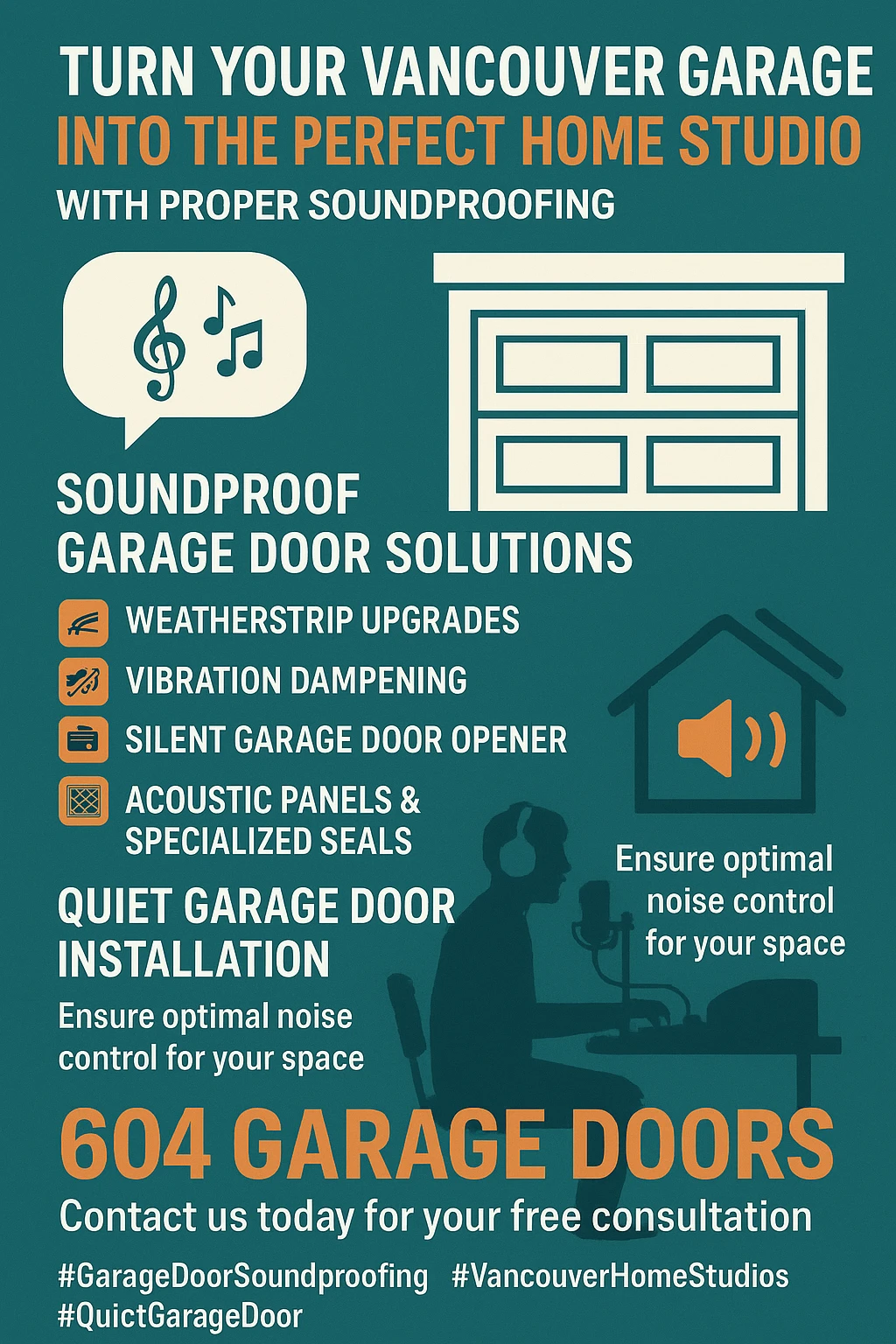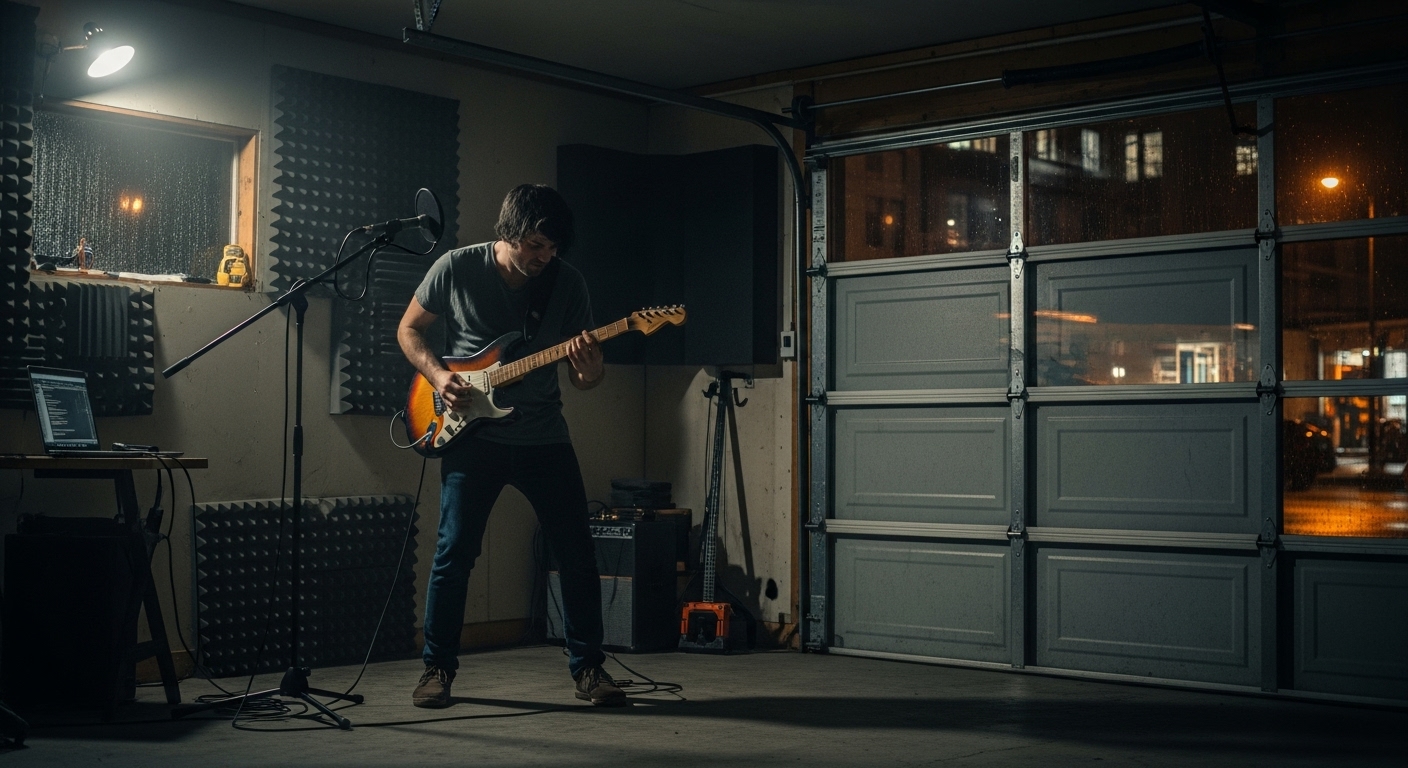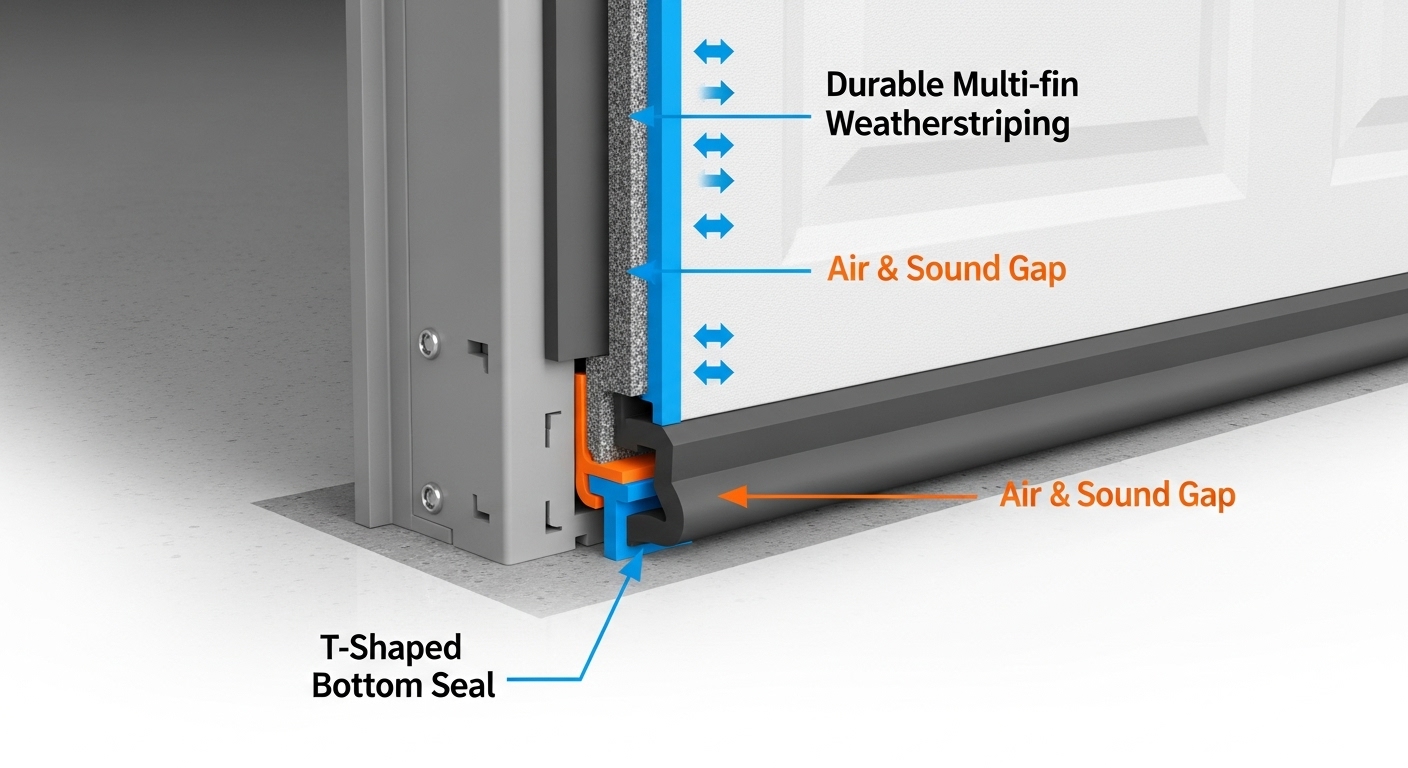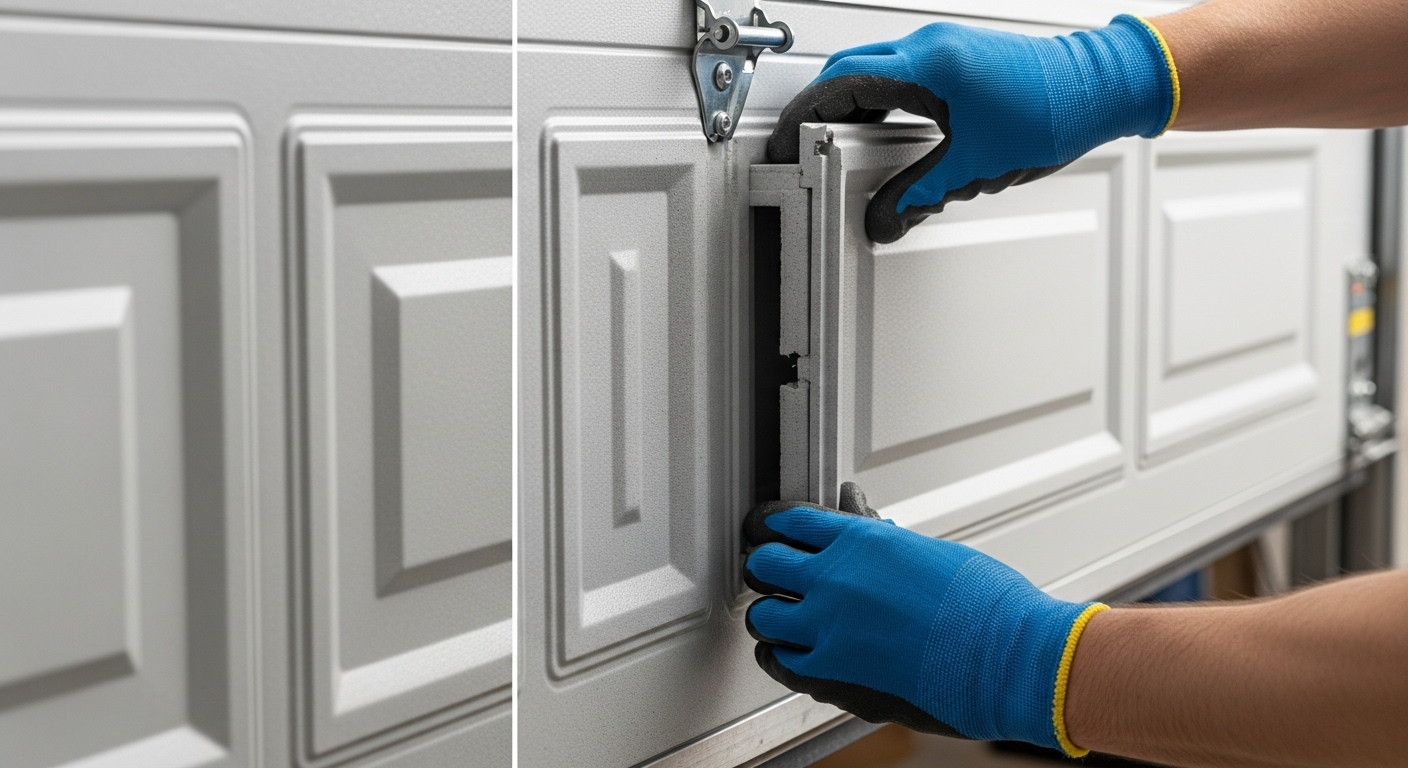How to Soundproof Your Vancouver Garage Door for Home Recording Studios and Noise-Sensitive Neighbors: Complete Insulation and Seal Solution Guide
Tired of your garage door sounding like a freight train every time it opens, or worried that your late-night recording sessions are turning you into the neighborhood villain? Let’s dive into the complete guide to transforming your noisy Vancouver garage into a whisper-quiet space that’ll keep both your creative flow and neighbor relations intact!
Picture this: it’s 2 AM, inspiration strikes, and you’re ready to lay down that killer guitar riff you’ve been working on. But then reality hits – your garage door sounds like it’s announcing your every move to the entire block, and your “soundproof” setup is about as effective as a screen door on a submarine. If you’re a Vancouver homeowner dealing with paper-thin garage doors that broadcast every sound to your noise-sensitive neighbors, or you’re trying to create a legitimate home recording space, you’ve probably discovered that standard garage doors have the acoustic properties of, well, a giant metal drum.
The truth is, most garage doors straight from the factory are acoustic disasters waiting to happen. With Sound Transmission Class (STC) ratings hovering around a pathetic 17, they’re basically broadcasting your business to anyone within a three-block radius. But here’s the good news – with the right combination of insulation, sealing techniques, and some strategic hardware upgrades, you can transform that noise-leaking nightmare into a properly soundproofed space that’ll make your neighbors forget you even exist (in the best possible way).
Vancouver’s unique coastal climate and urban density create some specific challenges we’ll tackle head-on. Between the moisture that loves to mess with your materials and the fact that half the city lives in attached-garage situations where sound travels through shared walls like gossip at a coffee shop, we’ve got some serious work to do. But don’t worry – we’re about to turn you into a garage soundproofing ninja.
Key Outtakes:
- Standard garage doors have STC ratings around 17, making them terrible for sound blocking, but proper soundproofing can boost this to 45+ with the right techniques
- The most effective approach combines multiple strategies: sealing gaps, adding acoustic mass through insulation, upgrading hardware components, and isolating vibration sources
- Vancouver’s coastal climate requires moisture-resistant materials and regular maintenance to prevent degradation of seals and weatherstripping
- Nylon rollers with sealed bearings can reduce operational noise by 30-40 decibels compared to standard metal rollers – one of the most cost-effective upgrades available
- Belt-drive garage door openers operate at 55-60 decibels versus 75-85 decibels for chain-drive systems, making opener choice critical for noise reduction

Understanding Your Garage Door’s Noise Problem

Before we start throwing money at soundproofing solutions like we’re feeding quarters into a broken arcade game, we need to understand exactly what we’re dealing with. Your garage door isn’t just one noise source – it’s like a symphony of acoustic annoyances, each playing their own special part in the cacophony that’s been driving you (and your neighbors) up the wall.
First up, we’ve got the structure-borne vs. airborne sound situation. Think of structure-borne sound as the sneaky ninja of noise transmission – it travels through solid materials like your walls, ceiling joists, and door frames, basically turning your entire house into a giant speaker cabinet. When your garage door opener motor hums and you hear it crystal clear in the bedroom above, that’s structure-borne sound doing its thing. Airborne sound, on the other hand, is the more obvious troublemaker – it’s the actual sound waves traveling through the air and finding every little gap, crack, and thin spot to sneak through.
The real kicker is that most garage doors are built like acoustic disasters waiting to happen. We’re talking lightweight, single-layer metal construction that’s basically designed to amplify sound rather than block it. Your standard hollow-core steel garage door has about as much sound-blocking capability as a screen door, and that’s not even accounting for all the gaps around the edges where sound just waltzes right through. Add in some metal rollers grinding against steel tracks, a chain-drive opener that sounds like it’s powered by an angry motorcycle engine, and hardware that’s been slowly loosening itself with every open-close cycle, and you’ve got yourself a perfect storm of neighborhood-disturbing noise.
Vancouver’s attached-garage homes make this situation even more complicated. When your garage shares walls with your neighbor’s living space or sits directly underneath bedrooms, every sound gets amplified and transmitted in ways that would make a seismic engineer weep. The coastal moisture doesn’t help either – it causes metal components to expand and contract, creating new gaps and loosening hardware faster than you can tighten it back up.
Sealing Every Gap: Your First Line of Defense

Now that we’ve diagnosed the problem, let’s start with what I call the “Swiss cheese solution” – plugging up all those holes that are letting sound escape like water through a sieve. This might not be the sexiest part of soundproofing, but it’s absolutely crucial because even tiny gaps can let through shocking amounts of sound. We’re talking about a measly 1% opening around your door allowing up to 50% of sound energy to pass through – that’s like trying to keep water in a swimming pool with a giant hole in the bottom.
The bottom seal of your garage door is enemy number one in the gap-sealing battle. Most garage doors have this pathetic excuse for a seal that’s either compressed into uselessness or has shrunk away from the floor, creating a sound highway right into your space. You want to upgrade to a proper T-shaped rubber seal that fits snugly into the door’s bottom retainer and creates an actual barrier against both sound and Vancouver’s infamous sideways rain. Quality rubber seals do double duty – they block sound waves and absorb vibrations, which is like getting two soundproofing solutions for the price of one.
Don’t sleep on the sides and top of your garage door frame either. Those gaps might look insignificant, but they’re working overtime to sabotage your soundproofing efforts. Multi-seals made from durable rubber create tight barriers around the entire perimeter of your garage door, and in Vancouver’s moisture-heavy environment, you want marine-grade materials that won’t turn into compressed chunks of useless rubber after one wet season. Brush seals can provide additional protection with bristles that sweep against the door surface, though they work best as secondary protection rather than your primary defense.
The interior door between your garage and your house often gets completely overlooked, but it’s frequently the weakest link in your entire soundproofing chain. Most of these doors are hollow-core construction with gaps around the frame that might as well be open windows from an acoustic standpoint. Installing a comprehensive door seal kit around this interior door can bump your sound blocking performance from “might as well not exist” to “actually functional.” We’re talking about acoustic sealant in every gap, weatherstripping around the entire frame, and possibly even upgrading to a solid-core door if your current one is particularly pathetic.
Vancouver’s climate throws some curveballs into the sealing game that you need to account for. The constant humidity and temperature fluctuations cause materials to expand, contract, and generally behave like moody teenagers. Your weatherstripping needs semi-annual inspection and replacement when it starts showing signs of wear, compression, or that telltale Vancouver green tinge that means moisture has been having its way with your materials. Rubber seals generally handle the coastal climate better than foam alternatives, but even the good stuff needs regular cleaning to prevent salt air and moisture from accelerating the breakdown process.
Insulation Materials: The Heavy Hitters of Sound Blocking

Alright, now we’re getting into the meaty stuff – literally adding mass to your garage door to make it less of a sound-transmitting nightmare. Think of insulation as your door’s bodyguard against noise; the heavier and denser it is, the better it can muscle sound waves into submission. But here’s where things get interesting – not all insulation is created equal when it comes to soundproofing, and the relationship between thermal R-values and acoustic performance isn’t as straightforward as most people think.
Fiberglass insulation is like the economy car of the insulation


